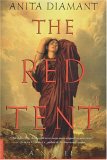Summary | Excerpt | Reading Guide | Reviews | Readalikes | Genres & Themes | Author Bio

But where Leah's hair was curly, Zilpah's black mane was straight, and she wore it to her waist. It was her best feature, and my aunt hated to cover it. Headdresses caused her head to pound, she said, putting a hand to her cheek with silly drama. Even as a child I was permitted to laugh at her. These headaches were the reason she gave for keeping so much inside the women's tents. She did not join the rest of us to bask in the springtime sun or find the breeze on a hot night. But when the moon was young - slender and shy, barely making herself known in the sky - Zilpah walked around the camp, swinging her long hair, clapping her hands, offering songs to encourage the moon's return.
When Jacob arrived, Bilhah was a child of eight, and she remembered nothing of the day. "She was probably up in a tree somewhere, sucking on her fingers and counting the clouds," said Leah, repeating the only thing that was remembered of Bilhah's early years.
Bilhah was the family orphan. The last daughter born of Laban's seed, she was the child of a slave named Tefnut - a tiny black woman who ran off one night when Bilhah was old enough to know she had been abandoned. "She never got over that hurt," said Zilpah with great gentleness, for Zilpah respected pain.
Bilhah was alone among them. It's not just that she was the youngest and that there were three other sisters to share the work. Bilhah was a sad child and it was easier to leave her alone. She rarely smiled and hardly spoke. Not even my grandmother Adah, who adored little girls and gathered motherless Zilpah to her inner circle and doted upon Rachel, could warm to this strange, lonely bird, who never grew taller than a boy of ten years, and whose skin was the color of dark amber.
Bilhah was not beautiful like Rachel, or capable like Leah, or quick like Zilpah. She was tiny, dark, and silent. Adah was exasperated by her hair, which was springy as moss and refused to obey her hands. Compared to the two other motherless girls, Bilhah was neglected dreadfully.
Left to herself, she climbed trees and seemed to dream. From her perch, she studied the world, the patterns in the sky, the habits of animals and birds. She came to know the flocks as individuals, giving each animal a secret name to match its personality. One evening, she came in from the fields and whispered to Adah that a black dwarf she-goat was ready to give birth to twins. It was nowhere near the season for goats to bear, and that particular animal had been barren for four seasons. Adah shook her head at Bilhah's nonsense and shooed her away.
The next day, Laban brought news of a strange event in the flocks, with a precise retelling of the little girl's prediction. Adah turned to the girl and apologized. "Bilhah sees clearly," said Adah to the other daughters, who turned to stare at this unseen sister and noticed, for the first time, the kindness in her black eyes.
If you took the time to look, you could see right away that Bilhah was good. She was good the way milk is good, the way rain is good. Bilhah watched the skies and the animals, and she watched her family, too. From the dark corners of the tents, she saw Leah hide her mortification when people stared. Bilhah noticed Rachel's fear of the dark and Zilpah's insomnia. Bilhah knew that Laban was every bit as mean-spirited as he was stupid.
Bilhah says her first clear memory of Jacob is from the day his first child was born. It was a boy - Reuben - and of course Jacob was delighted. He took his new son in his arms and danced the baby around and around outside the red tent.
"He was so gentle with the boy," Bilhah said. "He would not let Adah take Reuben away from him, even when the little one began to wail.
"He called his son perfect and a miracle in the world. I stood beside him and together Jacob and I worshiped the baby. We counted his fingers and stroked the soft crown of his head. We delighted in him and in each other's joy," Bilhah said. "That is when I met Jacob, your father."
Copyright Anita Diamant 1997. All rights reserved. Reprinted with the permission of the publisher, St Martin's Press.
Talent hits a target no one else can hit; Genius hits a target no one else can see.
Click Here to find out who said this, as well as discovering other famous literary quotes!
Your guide toexceptional books
BookBrowse seeks out and recommends the best in contemporary fiction and nonfiction—books that not only engage and entertain but also deepen our understanding of ourselves and the world around us.